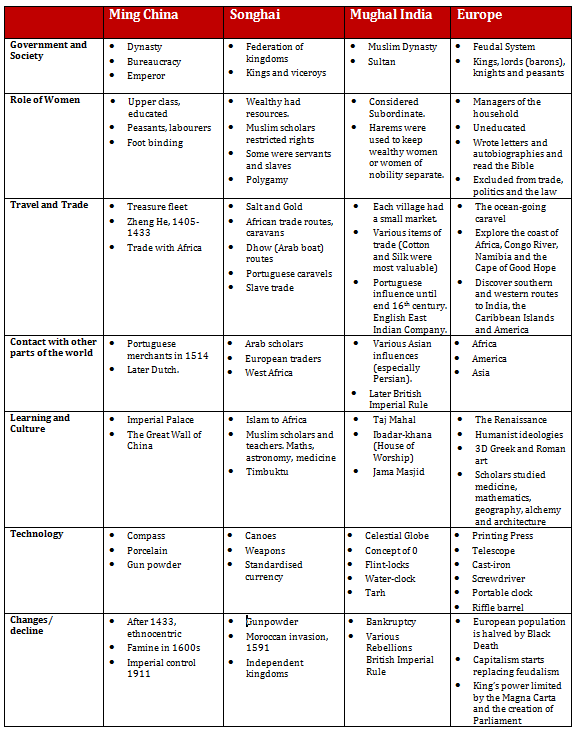At this stage, it was not at all clear that Europe would come to dominate the world. The intention is to provide a comparative overview of some of the major empires at this time with Europe, which was not an empire. These include China as a world power in the 14th and 15th centuries, Songhai, an African empire during the 15th and 16th Centuries, and the Indian Mughal Empire during the 16th and 17th centuries. This topic also includes a discussion on the European societal structures during the above mentioned time periods. Societies were dynamic and undergoing change - although the change was slower at that stage than after European expansion (Topic 2). In all units, include the role of women in society. The studies of the three empires should include accounts of the first contacts with Europe before conquests, when relationships were still balanced.
This topic will require students to do a comparative study on the following 4 sub-topics:
- Ming Dynasty, China in the 14th and 15th Century
- Songhai, African Empire, 15th and 16th Century
- Indian Mughal Empire, 1526 to 1858
- European Societies in the Middle Ages
Click the topics to go to their articles.
Example questions:
Based on the 2012 Grade 10 NSC Exemplar Paper:
The world in 1500 was different from the world we live in today. It was a world in which no one continent or culture dominated the rest. Each had its own strength and weaknesses, but they were equal.Discuss the changes that societies underwent during the period 1340 to 1850 in any ONE of the following empires.
- The Ming Dynasty
- The Songhai Empire
- The Mughal Empire
Explain to what extent you agree with the above statement by referring to a case study from any ONE of the following empires:
- The Ming Dynasty
- The Songhai Empire
- The Mughal Empire

Source for table layout. [2] The sub-headings are guided by the CAPS Guide
This content was originally produced for the SAHO classroom by
Ilse Brookes, Amber Fox-Martin & Simone van der Colff
End Notes
[1] The Western Cape Education Department, South Africa, “History Grade 10 2012 Exemplar,” (Accessed 22 June 2020), Available at: http://www.wcedcurriculum.westerncape.gov.za/jdownloads/History/Downloads/history_gr_10_exemplar_2012_eng.pdf ↵
[2]N. Worden, J. Bottaro, P. Visser, P. “In Search of History: Grade 10 Learner’s Book”. ↵